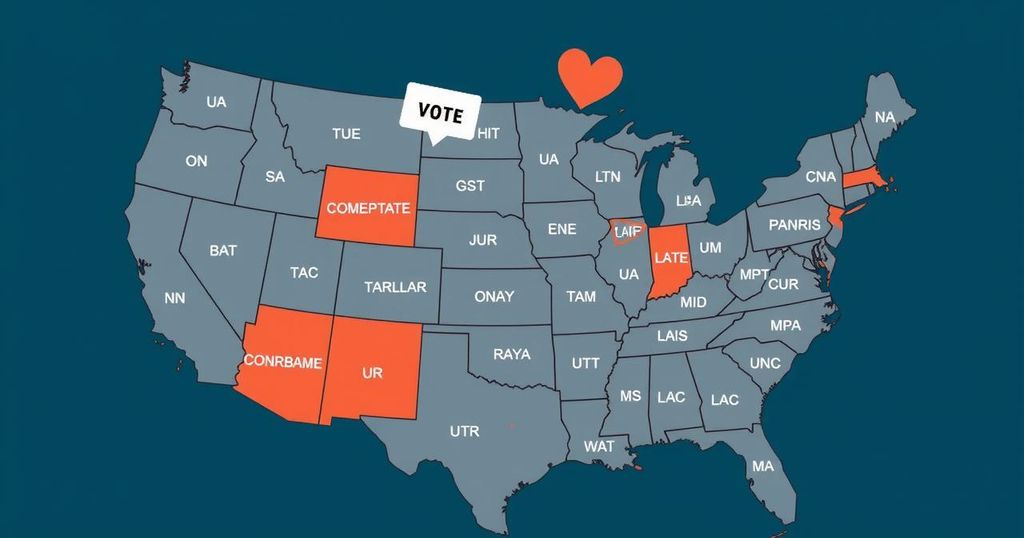Voters across the United States rejected a majority of proposed election reform initiatives, including ranked choice voting and open primaries, despite a substantial funding effort exceeding $100 million. The outcomes reflected a reluctance to depart from traditional voting mechanisms. Advocates acknowledge the need for more grassroots support and may consider strategic changes for future campaigns, emphasizing a gradual approach to reforming the electoral process.
Despite an extensive investment exceeding $100 million by advocates of election reform, major initiatives aimed at altering voting procedures across various states were largely rejected by voters. This disappointing outcome encompassed proposals including ranked choice voting and open primaries, with activities occurring in states such as Arizona, Colorado, Idaho, and Nevada. Activists had initially gathered in optimism, anticipating that voters would embrace these reforms, yet the results indicate a resistance to change. John Opdycke, from Open Primaries, reflected on the effort’s premature launch, suggesting a lack of substantial grassroots support may have hindered their success.
The rejected proposals sought to implement open primaries that would allow all candidates to appear on one ballot, while ranked choice voting would enable individuals to prioritize multiple candidates. These concepts gained traction in the past, especially after Alaska’s narrow approval of similar reforms in 2020, but the recent election cycle demonstrated a significant pushback. Trent England of Save Our States articulated that while many voters expressed frustration with the current political landscape, most appear satisfied with traditional voting methods.
Although ranked choice voting has shown to occasionally alter electoral outcomes under specific circumstances, its overall adoption remains uncertain. Recent analyses revealed that the system was necessary in only 30% of cases analyzed in jurisdictions utilizing ranked choice. Moreover, instances of decreased voter participation in Portland highlighted concerns regarding the clarity and accessibility of the ranked choice method.
Going forward, organizations financially backing these initiatives are considering strategic alterations in their approach. Potentially separating the campaigns for open primaries and ranked choice voting, and focusing on incremental changes may prove more effective in future elections. Nick Troiano from Unite America emphasized the need to discern how to succeed in the ongoing effort for electoral reform, rather than debating its necessity.
Ultimately, this election cycle underscores a complex relationship between voter preferences and proposed reforms, emphasizing the need for thorough groundwork prior to launching high-stakes initiatives.
The context surrounding this article lays emphasis on the continued struggle for electoral reform within the United States, particularly regarding innovative voting methods such as ranked choice voting and open primaries. These reformative ideas have been brought to the forefront in various states through statewide ballot initiatives. The stark rejection of such initiatives indicates a notable disconnect between activist efforts and voter readiness for change. Historically, there have been fleeting successes for such reforms, yet systemic acceptance remains elusive, highlighting the pivotal role of public sentiment and grassroots movements. Recognition of the challenges associated with reform efforts, particularly within diverse voter populations, is critical as advocates aim to evolve their strategies. Understanding the underpinnings of voters’ decisions in relation to traditional voting systems will inform future campaigns, especially given the demonstrated resistance observed during the recent elections.
In conclusion, the failure of the election reform initiatives across numerous states highlights significant voter resistance to radical changes in voting procedures, despite comprehensive funding and effort from reform advocates. The insights from key individuals within organizations focused on reform suggest a need for patience and strategy adjustment ahead of future initiatives. As discussions evolve surrounding voter preferences and inclusive practices, advocates remain hopeful yet recognize the challenge ahead in earning widespread support for alternative voting methods.
Original Source: gazette.com







